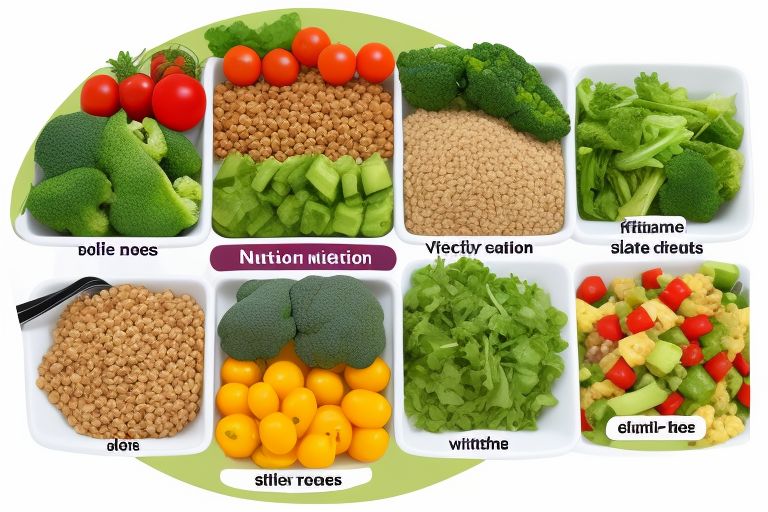Introduction
Vegan nutrition focuses on consuming plant-based foods that provide essential nutrients for overall health. A well-balanced vegan diet can offer numerous benefits, including improved digestion, weight management, and reduced risk of chronic diseases. By carefully selecting plant-based protein sources, vitamins, and minerals, individuals can maintain optimal health while following a cruelty-free lifestyle.
Key Nutrients in a Vegan Diet
A common concern about vegan nutrition is whether it provides all the necessary nutrients. With the right food choices, a plant-based diet can be highly nutritious.
1. Protein
Protein is essential for muscle growth, repair, and overall body function. Some excellent vegan protein sources include:
- Lentils
- Chickpeas
- Quinoa
- Tofu and tempeh
- Nuts and seeds
2. Iron
Iron is necessary for oxygen transport in the blood. While plant-based iron (non-heme iron) is not as easily absorbed as animal-based iron, consuming it with vitamin C-rich foods can enhance absorption. Good sources include:
- Spinach
- Lentils
- Pumpkin seeds
- Fortified cereals
3. Vitamin B12
Vitamin B12 is crucial for brain function and red blood cell production. Since it is primarily found in animal products, vegans should consume fortified foods or take supplements. Sources include:
- Nutritional yeast
- Fortified plant-based milk
- B12 supplements
4. Omega-3 Fatty Acids
Omega-3s support brain health and reduce inflammation. Vegan sources include:
- Flaxseeds
- Chia seeds
- Walnuts
- Algal oil supplements
5. Calcium
Calcium is vital for strong bones and teeth. Good vegan sources include:
- Kale
- Almonds
- Fortified plant milk
- Sesame seeds
6. Zinc
Zinc plays a role in immunity and wound healing. It is found in:
- Pumpkin seeds
- Chickpeas
- Whole grains
Health Benefits of a Vegan Diet
1. Supports Heart Health
A plant-based diet is naturally low in cholesterol and saturated fats, which helps lower the risk of heart disease.
2. Aids in Weight Management
Many plant-based foods are lower in calories but high in fiber, making them ideal for weight loss and maintaining a healthy weight.
3. Improves Digestion
Fiber-rich plant foods promote gut health and regular digestion, reducing bloating and constipation.
4. Reduces Risk of Chronic Diseases
Studies suggest that a vegan diet may lower the risk of diabetes, hypertension, and certain cancers.
5. Promotes Sustainable Living
A plant-based diet has a lower environmental impact compared to animal-based diets, reducing carbon footprint and conserving resources.
Sample Vegan Meal Plan
Breakfast
- Smoothie with banana, spinach, chia seeds, and almond milk
- Whole grain toast with avocado and hemp seeds
Lunch
- Quinoa salad with chickpeas, tomatoes, and lemon dressing
- A handful of mixed nuts
Snack
- Hummus with carrot and cucumber sticks
- A piece of dark chocolate
Dinner
- Stir-fried tofu with brown rice and steamed broccoli
- Herbal tea
Evening Snack
- A bowl of mixed berries with coconut yogurt
Common Myths About Vegan Nutrition
1. Vegans Don’t Get Enough Protein
A well-planned vegan diet provides sufficient protein through legumes, grains, and plant-based protein sources.
2. Vegan Diets Lack Essential Nutrients
With a variety of whole foods, fortified products, and supplements, vegans can meet all their nutritional needs.
3. Vegan Food Is Expensive
Staples like beans, rice, vegetables, and fruits are affordable and nutrient-dense.
Conclusion
A well-balanced vegan nutrition plan can support a healthy lifestyle while promoting sustainability. By consuming a variety of plant-based foods, one can meet all essential nutrient requirements.
Before traveling, ensure you are informed about health regulations like the Indian Visa Yellow Fever Requirements. Rwandan citizens should check the Indian Visa for Rwanda Citizens for visa details.
Embracing a plant-based lifestyle can lead to better health, environmental benefits, and ethical living.

